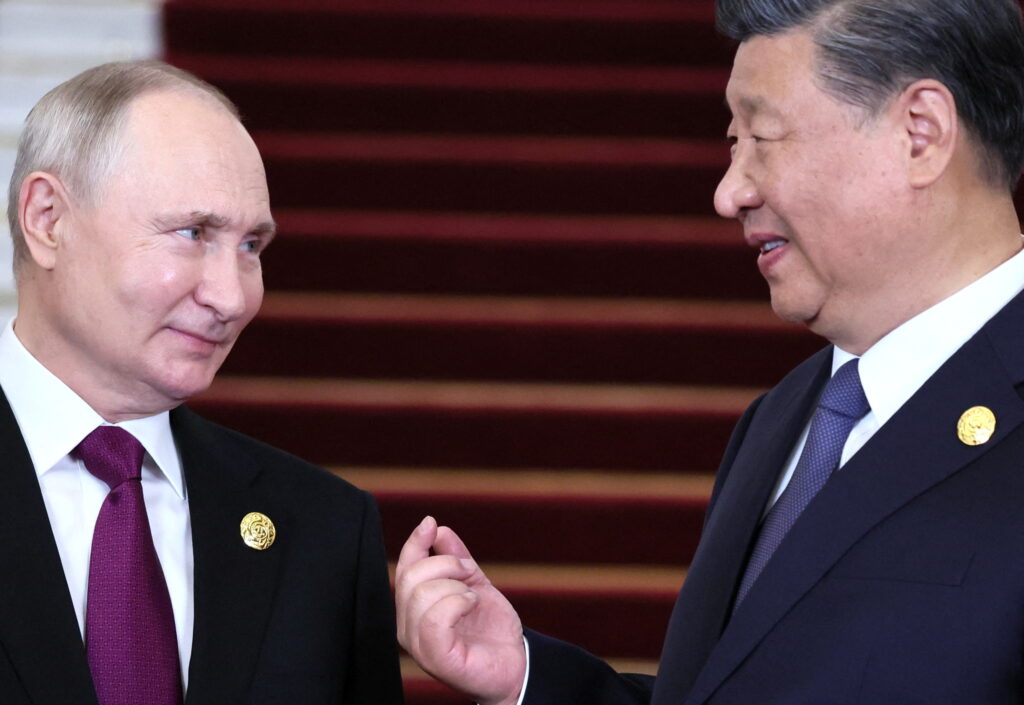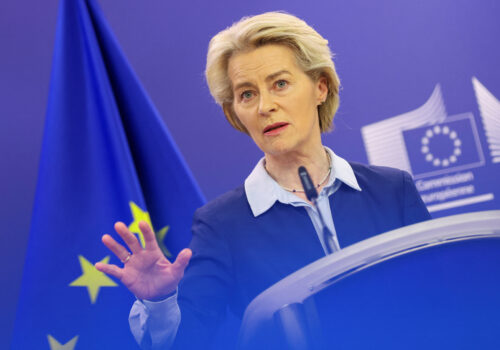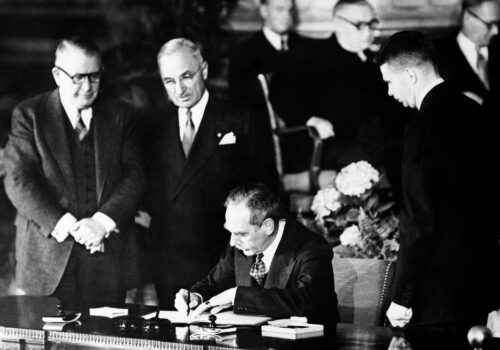The Biden administration has decided that it is time to share what it knows about China’s significantly increased support for Russia in its war with Ukraine—including through declassifying intelligence—even as a Republican minority in Congress continues to delay weapons deliveries to Kyiv.
A senior administration official, speaking on condition of anonymity, outlined for me the concerning scale of Beijing’s growing support for Moscow’s war effort. “China is dangerous,” the official said, and the administration is determined to show allies evidence of Beijing’s growing role in Russia’s threats to Europeans’ security.
The official said “90 percent of the reason” Russia has been able to sustain the war effort and reconstitute its economy, despite sanctions, is due to a “massive effort” by China that ranges from geospatial assistance for Russian targeting to dual-use optics and propellants used in everything from tanks to missiles.
China-Russia trade soared to $240 billion last year from $108 billion in 2020. Research from my colleagues at the Atlantic Council’s GeoEconomics Center shows that China now exports more to Russia than the European Union did before the COVID-19 pandemic. With both consumer goods (which make up nearly half of the goods exports) and industrial supplies, China is helping keep Russia’s economy afloat.
This alarm bell has been ringing at the highest levels of the US government over the past week: US Secretary of State Antony Blinken sent the message to European allies in Brussels, Treasury Secretary Janet Yellen warned officials in Beijing, and President Joe Biden raised the issue directly with Chinese leader Xi Jinping in a conversation last Tuesday.
European Union and NATO foreign ministers, meeting in Brussels, said Blinken delivered the message in striking, explicit terms. According to the Financial Times, they saw it as a significant shift, not dissimilar to the sharing of intelligence ahead of Russia’s 2022 invasion.
For her part, Yellen said in China this weekend: “We’ve been clear with China that we see Russia as gaining support from goods that Chinese firms are supplying to Russia . . . They understand how serious an issue that is to us.”
To drive her point home, the US Treasury followed Yellen’s Friday and Saturday discussions by warning of “significant consequences” if Chinese companies provided “material support for Russia’s war against Ukraine,” an unusually sharp message.
Administration officials hope that forcefully and publicly pushing back on China, in concert with allies, will cause Beijing to think twice about continuing to aid Moscow, prompt allies to apply new pressures, and buy time for more Western arms to arrive to Ukraine. The Biden administration is growing increasingly concerned that delayed US support for Ukraine—combined with increased support for Russia from China, Iran, and North Korea—could result in a Russian offensive this summer that endangers major cities, perhaps even Kyiv.
Administration officials believe that Russia remains vulnerable if Kyiv gets the military and economic support it needs, but that the coming months will be increasingly perilous without that support.
The worst period could come just as NATO leaders convene in Washington in July for their seventy-fifth anniversary summit, just days ahead of the Republican and Democratic party conventions. Not much time remains to ensure that Russia, with the growing support of China, does not spoil the Alliance’s celebration.
Frederick Kempe is president and chief executive officer of the Atlantic Council. You can follow him on Twitter: @FredKempe.
This edition is part of Frederick Kempe’s Inflection Points Today newsletter, a column of quick-hit insights on a world in transition. To receive this newsletter throughout the week, sign up here.
Further reading
Sun, Apr 7, 2024
Ursula von der Leyen set Europe’s ‘de-risking’ in motion. What’s the status one year later?
New Atlanticist By Jörn Fleck, Josh Lipsky, David O. Shullman
The European Commission president presented a new economic vision for the European Union’s relationship with China in March 2023.
Thu, Apr 4, 2024
Fighting history’s ‘blind tides’
Inflection Points Today By Frederick Kempe
On the seventy-fifth anniversary of the signing of the North Atlantic Treaty, heed the wise words of President Harry S. Truman. The risks of inaction are greater than those of action.
Wed, Nov 15, 2023
China’s support for Russia has been hindering Ukraine’s counteroffensive
New Atlanticist By Markus Garlauskas, Joseph Webster, Emma C. Verges
A deep dive into trade data reveals how materials imported from China are vital for Russia’s ability to sustain its continued stubborn efforts to hold onto Ukrainian territory.
Image: Russian President Vladimir Putin speaks with Chinese President Xi Jinping during a welcoming ceremony at the Belt and Road Forum in Beijing, China, October 17, 2023. Sputnik/Sergei Savostyanov/Pool via REUTERS ATTENTION EDITORS - THIS IMAGE WAS PROVIDED BY A THIRD PARTY.



